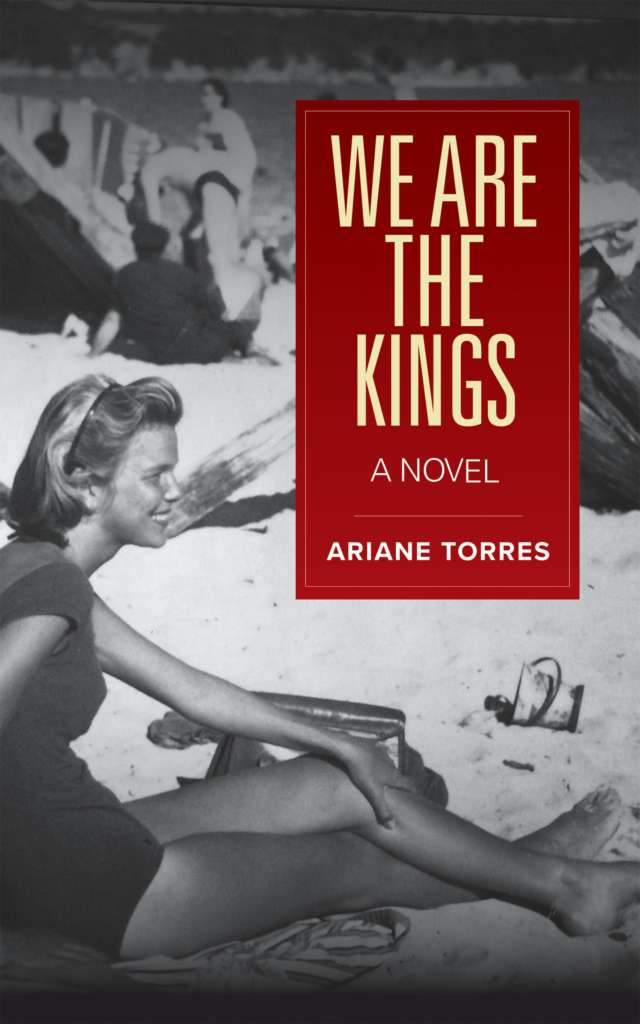In the novel, We are the Kings, Ariane Torres puts the matriarchy in focus. A multi-generational novel, it is about Marcella, who finds herself in a pivotal place in her life. She also learns about the death of her grandmother, Adele. The family learns more about Adele in her passing as a Jewish immigrant in post-war New York. The family also learns that what haunts the family as well as what happens when a woman tells her story.
I asked Ariane about prison advocacy, family lineage, character development, and New England.
Thank you, Ariane for sharing with Feminist Book Club about your writing.
Book content warning: physical abuse, abortion
1) What is your definition of feminism?
Ariane Torres: Feminism, to me, is the regular practice of both combatting sexism and injustice, and recognizing the unconditional dignity and equality of all people.
2) Where does the title We are the Kings come from?
Ariane Torres: The title comes from my protagonist’s analysis of Virginia Woolf’s novels. Marcella argues that Virginia Woolf knew all along that women played a vital role in reinforcing conventional narratives, and that if women chose to, they could elevate their own stories as opposed to uplifting those of the men in their lives.
3) There is a mighty number of characters. How did you decide how their lives would be in this story?
Ariane Torres: All of the characters came to me as moments or interactions, aspects of the experience of being a woman that I wanted to explore. They came to life fully formed, inexorably connected to each other through history and memory. For some reason my character development process usually involves imagining each person’s hands, their refrigerator and the way they store food, and their medicine cabinet. Like, would this person organize their produce, or buy a particular brand of toothpaste? Have their canned goods expired? Are their nails clipped and/or polished? I could tell you these habits of everyone I know. I love those sorts of details.

4) The story is layered and expansive as much as it is intimate. Why was this story not an epic 400 page novel?
Ariane Torres: I love this question! My favorite books are massive, sweeping, incredibly dense novels, and in many ways, I wanted to produce something like that. I think my years of academic writing, however, helped me to keep things concise. And because this is my first book, I was self-conscious about being too long-winded. But now that that’s out of the way, maybe I’ll try for an epic 400-pager for the next one!
5) Your graduate work was focused on aging in prison and you have worked in prison advocacy. How did you tie your work in these spaces into the story?
Ariane Torres: Engaging in activism about a social problem that I care deeply about was one of the most valuable experiences of my adult life. Broadening one’s perspective is almost always a good thing, and in my case, it changed me as a writer as well as a citizen of the world. Through the relationships I built with people who were or are in prison, my understanding of empathy, forgiveness, and resilience changed considerably, and I still apply what I was taught in prison to my life every day. In that way, it almost wasn’t even a conscious decision to include my understanding of built spaces and mass incarceration into my book because it has become so central to how I approach the world. A fundamental theme in my book—and life–is the power of story-telling. The stories I heard while doing my graduate research, and the methods in which they were told, were so powerful that they spilled into my creative life as well.
6) How did you decide to honor Jewish people in this novel?
Ariane Torres: I am very proud to be half Jewish. Although my Jewish grandmother’s best friend told me that I shouldn’t say that I’m half-Jewish because it’s impossible to be half-Jewish. She likened it to being half-pregnant, another impossibility. That being said, I identify as being spiritual, though not necessarily religious. To me, spirituality has a lot to do with story-telling, and the Jewish side of my family had an amazing trove of stories. (So did the Episcopalian side, but that’s for my next book). I think the best way to honor my family’s particular brand of Judaism is through story-telling, and I did my best to present the magic of being in the company of that side of my family in my book.
7) In this novel, death is reflective and opens up the family lineage. How did you write about death in a way that is not seen in fiction?
Ariane Torres: I lost my father when I was very young and maybe because of that, I’m slightly morose and can’t really conceive of the notion of family without also thinking about death. I wanted to capture the complexity of grief, that sometimes there is also relief, particularly after suffering for a long time. There is also the incomprehensible arbitrariness, and the fact that somehow, though I don’t really know how, people do move on in a way. Like most people, I find trying to wrap my head round the idea of death incredibly challenging, or impossible. Through my characters I tried to convey that strange juxtaposition as they grieved.
8) What do you appreciate about New England?
Ariane Torres: Almost everything, honestly! I lived here as a child and I attended college here as well. In my twenties I came to visit one of my best friends and when she picked me up at the airport, she was smoking a cigarette and drinking a Dunkin Donuts coffee and she immediately got in an argument with the guy in the toll booth who was also drinking a Dunkin Donuts coffee. Just listening to their accents made me really happy and I knew I wanted to live here again someday. Ridiculous stereotypes aside, I love the seasons, the architecture, and the proximity to much
of my family.


![Pride month is coming to an end and we're turning the chapter on our June theme: Be Gay, Do Crime 🏳️🌈 We spent the month with six different books, reading in community, and gave away some pretty cool titles in the online community.
This July we'll be diving into Disability Justice, but for now let's focus on the present.
What books did you read during Pride Month? 📚️
[alt text: an assortment of books by lgbtqia+ authors and feature lgbtqia+ stories arranged face up on a flat surface]
#bookstagram #pridebooks #lgbtq #bookclub #bookcommunity #feministbookc.ub](https://www.feministbookclub.com/wp-content/plugins/instagram-feed/img/placeholder.png)